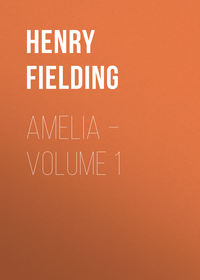 полная версия
полная версияHistory of Tom Jones, a Foundling
The soldier was now found lying in the same place and posture in which we just now left him. Several immediately applied themselves to raise him, and some concluded him dead; but they presently saw their mistake, for he not only struggled with those who laid their hands on him, but fell a roaring like a bull. In reality, he imagined so many spirits or devils were handling him; for his imagination being possessed with the horror of an apparition, converted every object he saw or felt into nothing but ghosts and spectres.
At length he was overpowered by numbers, and got upon his legs; when candles being brought, and seeing two or three of his comrades present, he came a little to himself; but when they asked him what was the matter? he answered, “I am a dead man, that’s all, I am a dead man, I can’t recover it, I have seen him.” “What hast thou seen, Jack?” says one of the soldiers. “Why, I have seen the young volunteer that was killed yesterday.” He then imprecated the most heavy curses on himself, if he had not seen the volunteer, all over blood, vomiting fire out of his mouth and nostrils, pass by him into the chamber where Ensign Northerton was, and then seizing the ensign by the throat, fly away with him in a clap of thunder.
This relation met with a gracious reception from the audience. All the women present believed it firmly, and prayed Heaven to defend them from murder. Amongst the men too, many had faith in the story; but others turned it into derision and ridicule; and a serjeant who was present answered very coolly, “Young man, you will hear more of this, for going to sleep and dreaming on your post.”
The soldier replied, “You may punish me if you please; but I was as broad awake as I am now; and the devil carry me away, as he hath the ensign, if I did not see the dead man, as I tell you, with eyes as big and as fiery as two large flambeaux.”
The commander of the forces, and the commander of the house, were now both arrived; for the former being awake at the time, and hearing the centinel fire his piece, thought it his duty to rise immediately, though he had no great apprehensions of any mischief; whereas the apprehensions of the latter were much greater, lest her spoons and tankards should be upon the march, without having received any such orders from her.
Our poor centinel, to whom the sight of this officer was not much more welcome than the apparition, as he thought it, which he had seen before, again related the dreadful story, and with many additions of blood and fire; but he had the misfortune to gain no credit with either of the last-mentioned persons: for the officer, though a very religious man, was free from all terrors of this kind; besides, having so lately left Jones in the condition we have seen, he had no suspicion of his being dead. As for the landlady, though not over religious, she had no kind of aversion to the doctrine of spirits; but there was a circumstance in the tale which she well knew to be false, as we shall inform the reader presently.
But whether Northerton was carried away in thunder or fire, or in whatever other manner he was gone, it was now certain that his body was no longer in custody. Upon this occasion the lieutenant formed a conclusion not very different from what the serjeant is just mentioned to have made before, and immediately ordered the centinel to be taken prisoner. So that, by a strange reverse of fortune (though not very uncommon in a military life), the guard became the guarded.
Chapter xv. – The conclusion of the foregoing adventure
Besides the suspicion of sleep, the lieutenant harboured another and worse doubt against the poor centinel, and this was, that of treachery; for as he believed not one syllable of the apparition, so he imagined the whole to be an invention formed only to impose upon him, and that the fellow had in reality been bribed by Northerton to let him escape. And this he imagined the rather, as the fright appeared to him the more unnatural in one who had the character of as brave and bold a man as any in the regiment, having been in several actions, having received several wounds, and, in a word, having behaved himself always like a good and valiant soldier.
That the reader, therefore, may not conceive the least ill opinion of such a person, we shall not delay a moment in rescuing his character from the imputation of this guilt.
Mr Northerton then, as we have before observed, was fully satisfied with the glory which he had obtained from this action. He had perhaps seen, or heard, or guessed, that envy is apt to attend fame. Not that I would here insinuate that he was heathenishly inclined to believe in or to worship the goddess Nemesis; for, in fact, I am convinced he never heard of her name. He was, besides, of an active disposition, and had a great antipathy to those close quarters in the castle of Gloucester, for which a justice of peace might possibly give him a billet. Nor was he moreover free from some uneasy meditations on a certain wooden edifice, which I forbear to name, in conformity to the opinion of mankind, who, I think, rather ought to honour than to be ashamed of this building, as it is, or at least might be made, of more benefit to society than almost any other public erection. In a word, to hint at no more reasons for his conduct, Mr Northerton was desirous of departing that evening, and nothing remained for him but to contrive the quomodo, which appeared to be a matter of some difficulty.
Now this young gentleman, though somewhat crooked in his morals, was perfectly straight in his person, which was extremely strong and well made. His face too was accounted handsome by the generality of women, for it was broad and ruddy, with tolerably good teeth. Such charms did not fail making an impression on my landlady, who had no little relish for this kind of beauty. She had, indeed, a real compassion for the young man; and hearing from the surgeon that affairs were like to go ill with the volunteer, she suspected they might hereafter wear no benign aspect with the ensign. Having obtained, therefore, leave to make him a visit, and finding him in a very melancholy mood, which she considerably heightened by telling him there were scarce any hopes of the volunteer’s life, she proceeded to throw forth some hints, which the other readily and eagerly taking up, they soon came to a right understanding; and it was at length agreed that the ensign should, at a certain signal, ascend the chimney, which communicating very soon with that of the kitchen, he might there again let himself down; for which she would give him an opportunity by keeping the coast clear.
But lest our readers, of a different complexion, should take this occasion of too hastily condemning all compassion as a folly, and pernicious to society, we think proper to mention another particular which might possibly have some little share in this action. The ensign happened to be at this time possessed of the sum of fifty pounds, which did indeed belong to the whole company; for the captain having quarrelled with his lieutenant, had entrusted the payment of his company to the ensign. This money, however, he thought proper to deposit in my landlady’s hand, possibly by way of bail or security that he would hereafter appear and answer to the charge against him; but whatever were the conditions, certain it is, that she had the money and the ensign his liberty.
The reader may perhaps expect, from the compassionate temper of this good woman, that when she saw the poor centinel taken prisoner for a fact of which she knew him innocent, she should immediately have interposed in his behalf; but whether it was that she had already exhausted all her compassion in the above-mentioned instance, or that the features of this fellow, though not very different from those of the ensign, could not raise it, I will not determine; but, far from being an advocate for the present prisoner, she urged his guilt to his officer, declaring, with uplifted eyes and hands, that she would not have had any concern in the escape of a murderer for all the world.
Everything was now once more quiet, and most of the company returned again to their beds; but the landlady, either from the natural activity of her disposition, or from her fear for her plate, having no propensity to sleep, prevailed with the officers, as they were to march within little more than an hour, to spend that time with her over a bowl of punch.
Jones had lain awake all this while, and had heard great part of the hurry and bustle that had passed, of which he had now some curiosity to know the particulars. He therefore applied to his bell, which he rung at least twenty times without any effect: for my landlady was in such high mirth with her company, that no clapper could be heard there but her own; and the drawer and chambermaid, who were sitting together in the kitchen (for neither durst he sit up nor she lie in bed alone), the more they heard the bell ring the more they were frightened, and as it were nailed down in their places.
At last, at a lucky interval of chat, the sound reached the ears of our good landlady, who presently sent forth her summons, which both her servants instantly obeyed. “Joe,” says the mistress, “don’t you hear the gentleman’s bell ring? Why don’t you go up?” – “It is not my business,” answered the drawer, “to wait upon the chambers – it is Betty Chambermaid’s.” – “If you come to that,” answered the maid, “it is not my business to wait upon gentlemen. I have done it indeed sometimes; but the devil fetch me if ever I do again, since you make your preambles about it.” The bell still ringing violently, their mistress fell into a passion, and swore, if the drawer did not go up immediately, she would turn him away that very morning. “If you do, madam,” says he, “I can’t help it. I won’t do another servant’s business.” She then applied herself to the maid, and endeavoured to prevail by gentle means; but all in vain: Betty was as inflexible as Joe. Both insisted it was not their business, and they would not do it.
The lieutenant then fell a laughing, and said, “Come, I will put an end to this contention;” and then turning to the servants, commended them for their resolution in not giving up the point; but added, he was sure, if one would consent to go the other would. To which proposal they both agreed in an instant, and accordingly went up very lovingly and close together. When they were gone, the lieutenant appeased the wrath of the landlady, by satisfying her why they were both so unwilling to go alone.
They returned soon after, and acquainted their mistress, that the sick gentleman was so far from being dead, that he spoke as heartily as if he was well; and that he gave his service to the captain, and should be very glad of the favour of seeing him before he marched.
The good lieutenant immediately complied with his desires, and sitting down by his bed-side, acquainted him with the scene which had happened below, concluding with his intentions to make an example of the centinel.
Upon this Jones related to him the whole truth, and earnestly begged him not to punish the poor soldier, “who, I am confident,” says he, “is as innocent of the ensign’s escape, as he is of forging any lie, or of endeavouring to impose on you.”
The lieutenant hesitated a few moments, and then answered: “Why, as you have cleared the fellow of one part of the charge, so it will be impossible to prove the other, because he was not the only centinel. But I have a good mind to punish the rascal for being a coward. Yet who knows what effect the terror of such an apprehension may have? and, to say the truth, he hath always behaved well against an enemy. Come, it is a good thing to see any sign of religion in these fellows; so I promise you he shall be set at liberty when we march. But hark, the general beats. My dear boy, give me another buss. Don’t discompose nor hurry yourself; but remember the Christian doctrine of patience, and I warrant you will soon be able to do yourself justice, and to take an honourable revenge on the fellow who hath injured you.” The lieutenant then departed, and Jones endeavoured to compose himself to rest.
BOOK VIII. – CONTAINING ABOUT TWO DAYS
Chapter i. – A wonderful long chapter concerning the marvellous; being much the longest of all our introductory chapters
As we are now entering upon a book in which the course of our history will oblige us to relate some matters of a more strange and surprizing kind than any which have hitherto occurred, it may not be amiss, in the prolegomenous or introductory chapter, to say something of that species of writing which is called the marvellous. To this we shall, as well for the sake of ourselves as of others, endeavour to set some certain bounds, and indeed nothing can be more necessary, as critics8 of different complexions are here apt to run into very different extremes; for while some are, with M. Dacier, ready to allow, that the same thing which is impossible may be yet probable,9 others have so little historic or poetic faith, that they believe nothing to be either possible or probable, the like to which hath not occurred to their own observation.
First, then, I think it may very reasonably be required of every writer, that he keeps within the bounds of possibility; and still remembers that what it is not possible for man to perform, it is scarce possible for man to believe he did perform. This conviction perhaps gave birth to many stories of the antient heathen deities (for most of them are of poetical original). The poet, being desirous to indulge a wanton and extravagant imagination, took refuge in that power, of the extent of which his readers were no judges, or rather which they imagined to be infinite, and consequently they could not be shocked at any prodigies related of it. This hath been strongly urged in defence of Homer’s miracles; and it is perhaps a defence; not, as Mr Pope would have it, because Ulysses told a set of foolish lies to the Phaeacians, who were a very dull nation; but because the poet himself wrote to heathens, to whom poetical fables were articles of faith. For my own part, I must confess, so compassionate is my temper, I wish Polypheme had confined himself to his milk diet, and preserved his eye; nor could Ulysses be much more concerned than myself, when his companions were turned into swine by Circe, who showed, I think, afterwards, too much regard for man’s flesh to be supposed capable of converting it into bacon. I wish, likewise, with all my heart, that Homer could have known the rule prescribed by Horace, to introduce supernatural agents as seldom as possible. We should not then have seen his gods coming on trivial errands, and often behaving themselves so as not only to forfeit all title to respect, but to become the objects of scorn and derision. A conduct which must have shocked the credulity of a pious and sagacious heathen; and which could never have been defended, unless by agreeing with a supposition to which I have been sometimes almost inclined, that this most glorious poet, as he certainly was, had an intent to burlesque the superstitious faith of his own age and country.
But I have rested too long on a doctrine which can be of no use to a Christian writer; for as he cannot introduce into his works any of that heavenly host which make a part of his creed, so it is horrid puerility to search the heathen theology for any of those deities who have been long since dethroned from their immortality. Lord Shaftesbury observes, that nothing is more cold than the invocation of a muse by a modern; he might have added, that nothing can be more absurd. A modern may with much more elegance invoke a ballad, as some have thought Homer did, or a mug of ale, with the author of Hudibras; which latter may perhaps have inspired much more poetry, as well as prose, than all the liquors of Hippocrene or Helicon.
The only supernatural agents which can in any manner be allowed to us moderns, are ghosts; but of these I would advise an author to be extremely sparing. These are indeed, like arsenic, and other dangerous drugs in physic, to be used with the utmost caution; nor would I advise the introduction of them at all in those works, or by those authors, to which, or to whom, a horse-laugh in the reader would be any great prejudice or mortification.
As for elves and fairies, and other such mummery, I purposely omit the mention of them, as I should be very unwilling to confine within any bounds those surprizing imaginations, for whose vast capacity the limits of human nature are too narrow; whose works are to be considered as a new creation; and who have consequently just right to do what they will with their own.
Man therefore is the highest subject (unless on very extraordinary occasions indeed) which presents itself to the pen of our historian, or of our poet; and, in relating his actions, great care is to be taken that we do not exceed the capacity of the agent we describe.
Nor is possibility alone sufficient to justify us; we must keep likewise within the rules of probability. It is, I think, the opinion of Aristotle; or if not, it is the opinion of some wise man, whose authority will be as weighty when it is as old, “That it is no excuse for a poet who relates what is incredible, that the thing related is really matter of fact.” This may perhaps be allowed true with regard to poetry, but it may be thought impracticable to extend it to the historian; for he is obliged to record matters as he finds them, though they may be of so extraordinary a nature as will require no small degree of historical faith to swallow them. Such was the successless armament of Xerxes described by Herodotus, or the successful expedition of Alexander related by Arrian. Such of later years was the victory of Agincourt obtained by Harry the Fifth, or that of Narva won by Charles the Twelfth of Sweden. All which instances, the more we reflect on them, appear still the more astonishing.
Such facts, however, as they occur in the thread of the story, nay, indeed, as they constitute the essential parts of it, the historian is not only justifiable in recording as they really happened, but indeed would be unpardonable should he omit or alter them. But there are other facts not of such consequence nor so necessary, which, though ever so well attested, may nevertheless be sacrificed to oblivion in complacence to the scepticism of a reader. Such is that memorable story of the ghost of George Villiers, which might with more propriety have been made a present of to Dr Drelincourt, to have kept the ghost of Mrs Veale company, at the head of his Discourse upon Death, than have been introduced into so solemn a work as the History of the Rebellion.
To say the truth, if the historian will confine himself to what really happened, and utterly reject any circumstance, which, though never so well attested, he must be well assured is false, he will sometimes fall into the marvellous, but never into the incredible. He will often raise the wonder and surprize of his reader, but never that incredulous hatred mentioned by Horace. It is by falling into fiction, therefore, that we generally offend against this rule, of deserting probability, which the historian seldom, if ever, quits, till he forsakes his character and commences a writer of romance. In this, however, those historians who relate public transactions, have the advantage of us who confine ourselves to scenes of private life. The credit of the former is by common notoriety supported for a long time; and public records, with the concurrent testimony of many authors, bear evidence to their truth in future ages. Thus a Trajan and an Antoninus, a Nero and a Caligula, have all met with the belief of posterity; and no one doubts but that men so very good, and so very bad, were once the masters of mankind.
But we who deal in private character, who search into the most retired recesses, and draw forth examples of virtue and vice from holes and corners of the world, are in a more dangerous situation. As we have no public notoriety, no concurrent testimony, no records to support and corroborate what we deliver, it becomes us to keep within the limits not only of possibility, but of probability too; and this more especially in painting what is greatly good and amiable. Knavery and folly, though never so exorbitant, will more easily meet with assent; for ill-nature adds great support and strength to faith.
Thus we may, perhaps, with little danger, relate the history of Fisher; who having long owed his bread to the generosity of Mr Derby, and having one morning received a considerable bounty from his hands, yet, in order to possess himself of what remained in his friend’s scrutore, concealed himself in a public office of the Temple, through which there was a passage into Mr Derby’s chambers. Here he overheard Mr Derby for many hours solacing himself at an entertainment which he that evening gave his friends, and to which Fisher had been invited. During all this time, no tender, no grateful reflections arose to restrain his purpose; but when the poor gentleman had let his company out through the office, Fisher came suddenly from his lurking-place, and walking softly behind his friend into his chamber, discharged a pistol-ball into his head. This may be believed when the bones of Fisher are as rotten as his heart. Nay, perhaps, it will be credited, that the villain went two days afterwards with some young ladies to the play of Hamlet; and with an unaltered countenance heard one of the ladies, who little suspected how near she was to the person, cry out, “Good God! if the man that murdered Mr Derby was now present!” manifesting in this a more seared and callous conscience than even Nero himself; of whom we are told by Suetonius, “that the consciousness of his guilt, after the death of his mother, became immediately intolerable, and so continued; nor could all the congratulations of the soldiers, of the senate, and the people, allay the horrors of his conscience.”
But now, on the other hand, should I tell my reader, that I had known a man whose penetrating genius had enabled him to raise a large fortune in a way where no beginning was chaulked out to him; that he had done this with the most perfect preservation of his integrity, and not only without the least injustice or injury to any one individual person, but with the highest advantage to trade, and a vast increase of the public revenue; that he had expended one part of the income of this fortune in discovering a taste superior to most, by works where the highest dignity was united with the purest simplicity, and another part in displaying a degree of goodness superior to all men, by acts of charity to objects whose only recommendations were their merits, or their wants; that he was most industrious in searching after merit in distress, most eager to relieve it, and then as careful (perhaps too careful) to conceal what he had done; that his house, his furniture, his gardens, his table, his private hospitality, and his public beneficence, all denoted the mind from which they flowed, and were all intrinsically rich and noble, without tinsel, or external ostentation; that he filled every relation in life with the most adequate virtue; that he was most piously religious to his Creator, most zealously loyal to his sovereign; a most tender husband to his wife, a kind relation, a munificent patron, a warm and firm friend, a knowing and a chearful companion, indulgent to his servants, hospitable to his neighbours, charitable to the poor, and benevolent to all mankind. Should I add to these the epithets of wise, brave, elegant, and indeed every other amiable epithet in our language, I might surely say,
– Quis credet? nemo Hercule! nemo;
Vel duo, vel nemo;
and yet I know a man who is all I have here described. But a single instance (and I really know not such another) is not sufficient to justify us, while we are writing to thousands who never heard of the person, nor of anything like him. Such rarae aves should be remitted to the epitaph writer, or to some poet who may condescend to hitch him in a distich, or to slide him into a rhime with an air of carelessness and neglect, without giving any offence to the reader.
In the last place, the actions should be such as may not only be within the compass of human agency, and which human agents may probably be supposed to do; but they should be likely for the very actors and characters themselves to have performed; for what may be only wonderful and surprizing in one man, may become improbable, or indeed impossible, when related of another.









